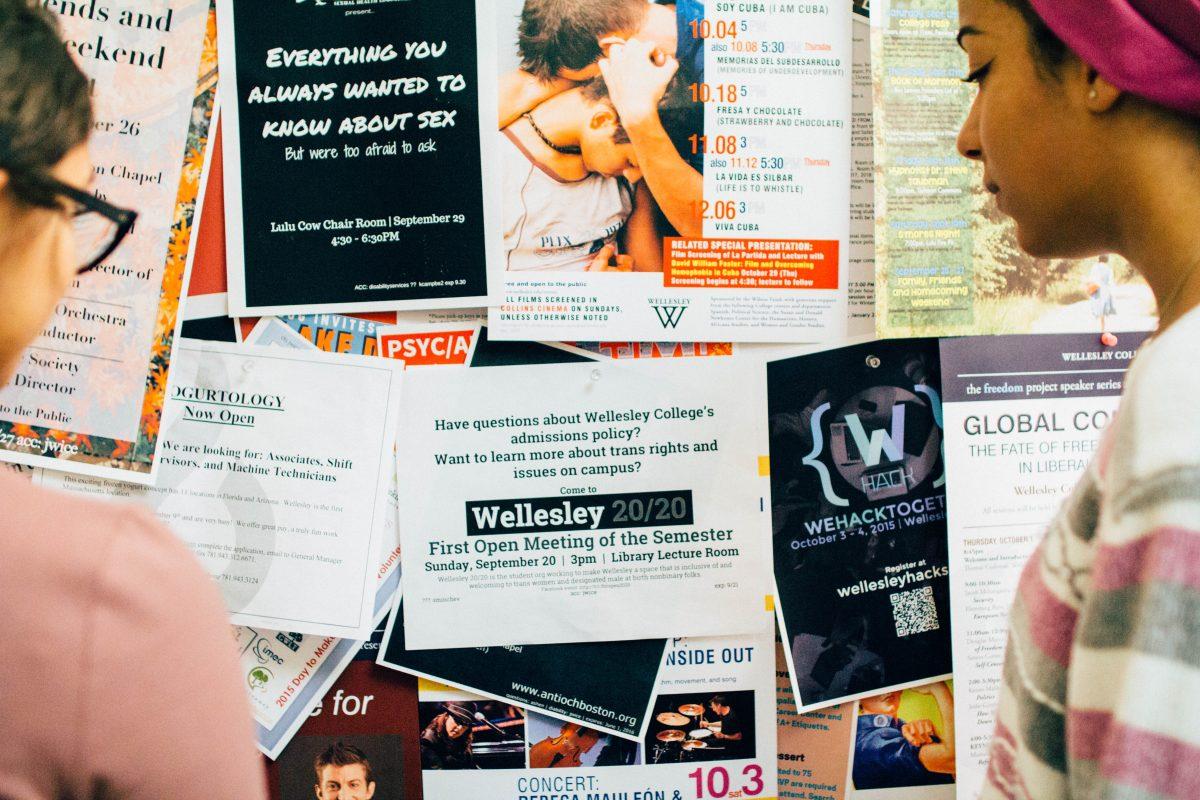Wellesley 20/20 continues education on trans issues
Trans People of Color Collective (TPOCC) is a new organization on campus serving transgender and gender non-conforming people of color. This is the first organization on the Wellesley campus dedicated specifically to POC (people of color) gender identity issues. While there are pre-existing POC LGBTQIA* groups on campus, members of TPOCC wanted to address unique issues regarding the intersectionality of race and gender identity.
“This group exists to interrupt the cycle of the erasing, shaming and misunderstanding of trans people of color, who face a disproportionate amount of structural violence,” TPOCC member Eunbyul Lee ’17 said.
TPOCC’s mission is to provide a safe, affirming and accountable space for non-cisnormative (individuals who do not identify with their sex designated at birth) POCs to support each other and share their experiences. A TPOCC member’s identity is kept secret and not shared with the greater Wellesley community unless they give the organization explicit permission.
Lee believes that while many students openly accept transgender and gender nonconforming students, but they still face additional marginalization that manifests itself in different ways. According to Lee, many of TPOCC’s members feel pressure to fulfill societal constructs regarding whom a trans person should be.
“People generally assume that ‘transgender’ must mean a switch within the binary from woman to man, from feminine to masculine and vice versa. This misunderstanding leads to the exclusion of many femmes of color, non-binary people of color, and transgender people of color,” Lee said.
Lee believes that these misconceptions stem from the domination of white masculine transgender narratives in society, leading to an insufficient dialogue regarding the intersectionality of race and gender.
“When you do not fit into either of those [archetypes], visibility or even self-acceptance can quickly become unattainable goals,” Lee said.
A member of Tea Talks, the organization serving LGBTQIA* students of Asian descent additionally mentioned that many transgender students may refrain from engaging in campus discussions about gender identity because they may be used as a token figure or have their opinions wrongly interpreted as speaking for an entire community.
As Wellesley has not yet admitted trans women or transfeminine students, they are not included in TPOCC. However, Lee hopes that as designated male at birth (DMAB) (individuals whose birth certificates read “male” regardless of what gender they identify with) students are accepted to Wellesley TPOCC will offer them a community on campus.
“As we know, trans women of color face the most disproportionate amount of structural violence, and not only are we required to be aware of this, but we must work to combat it in every capacity that we can, including acknowledging this group’s inadequacy,” Lee said.
Student activist group Wellesley 20/20 is also working to make Wellesley a more inclusive and welcoming place for trans women and non-binary individuals regardless of assigned sex at birth.
While Wellesley 20/20 did not have a direct role in crafting the Reaffirmation of Mission and Gender Policy that was created last spring, members Sofie Werthan ’18 and Sam Mincheva ’17 served as student members of the President’s Advisory Committee on Gender and Wellesley, which recommended the current gender admissions policy. The group also submitted a petition consisting of 389 signatures asking the Board to admit trans women and DMAB non-binary students.
Since the Reaffirmation was released, 20/20’s new goals include making Wellesley a safe place for trans women and advocating for the admission of all non-binary students regardless of their gender designated at birth.
“One of our main goals for the semester… is amplifying the voices of trans women in the work that we are doing. We want to make sure that we are doing as much as we can as an organization to step back and let the voices of trans women and DMAB non-binary folks be heard,” the Wellesley 20/20 group said in a statement.
While members of Wellesley 20/20 are excited that Wellesley’s policy is now explicitly inclusive of transgender women and designated female at birth non-binary people, many members believe that Wellesley is not yet a safe and inclusive space for transgender women.
“Even though Wellesley’s official admissions policy has been expanded to include trans women, the culture and education level on campus has a long way to go,” Wellesley 20/20 said. “It’s not enough to say that we have an accessible admissions policy if the students who arrive here feel unsafe or unwelcome, or are treated with ignorance, hostility or disrespect.”
One member of Wellesley 20/20 said in an open meeting that they would not feel comfortable recommending Wellesley to trans women at the present time.
“In a perfect world trans women could come to Wellesley and feel completely safe and included, but we’re not there yet. We should try to make [Wellesley] the community that it could be,” the member said.
Wellesley 20/20 hopes to continue working with the administration and the greater Wellesley community to promote awareness and inclusivity in the coming semester.
Photo by Havannah Tran ’19, Contributing Photographer






